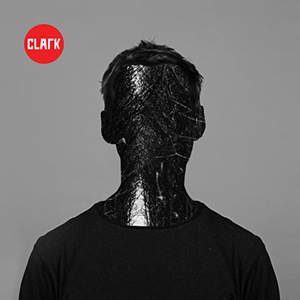Clark Clark
Chris Clark has put out records on Warp for about 13 years now, but it […]

Chris Clark has put out records on Warp for about 13 years now, but it would seem that he’s one of the label’s least appreciated artists. Off-the-cuff references to the long-running imprint almost invariably mention Aphex Twin, Plaid, and Autechre, perhaps because the label remains understood by more casual listeners as an IDM-industrial complex, a hub that’s mass-producing electronic music with a specific intent to confuse, confront, and occasionally intimidate. That’s patently not the case, and especially not so with Clark. The UK-born, Berlin-based producer makes music that is a bit more accessible than that of some of his more revered labelmates, though his last six albums have absorbed elements of the algorhythmic patterns and strident machine melodies of these artists.
In this context, Clark’s self-titled seventh album feels like a subtle reassertion of his artistic identity, though the LP’s cover art, a portrait of Clark with a black tarpaulin shroud over his face and neck, suggests that some aspect of it will remain evasive and unknowable. Clark is an album of gentle shifts and sweeping operatic gestures; it moves from one to the other and back again with balletic poise, and its contents are similarly graceful and muscular. “Strength Through Fragility” is a four-bar grand piano loop that sounds as if it’s being played outdoors in a howling winter gale, and, positioned in front of the roof-cleaving whirlwind of “Sodium Trimmers,” it anticipates what’s to come like a spinning weather vane.
For an LP that sounds so ice-bound and exposed to the elements, it’s never so cold as to become disinviting. “Winter Linn” is a slow, austere hum of modular synths, small piano pieces, and warm, sheet-sized synths, thrumming with gilded cogs and belt drives that work in tandem with drums that could drill through concrete. But even at its most intense and unyielding, Clark is invigorating rather than oppressive. Songs such as “Unfurla” and “Sodium Trimmers” will get a good thrashing in dark, laser-lit techno clubs, but it’s an album ultimately made for the outdoors.
“Snowbird,” for example, pairs another set of stomping, spirit level-bothering drums with a shawl of fragile melodies and textures: principally, a behind-the-beat xylophone, and a wispy, somewhat spectral child’s voice. The effect is simultaneously soothing and foreboding. “Beacon” and “Petroleum Tinged” are similarly designed for exposure rather than confinement, and, beatless though they may be, are as insistent and bracing as the album’s nominally groovier pieces. The former begins with a reedy, oscillating synth that, after 20 seconds or so, swells rapidly into a humid, planetary sphere of noise that draws passing snare brushes and humanoid synth notes into its orbit. About halfway through, the track decompresses steadily and withdraws into a melodic hum, which eventually gives way to “Petroleum Tinged,” a Vangelis-inspired passage of somber, swollen pads and glassy synths.
Clark is awash with these introspective moments. At times, it sounds like an ambient album masquerading as a techno record, even though there’s a kickdrum present on a little over half of these 13 tracks. That said, the LP’s white-hot bursts of energy are all the more thrilling for their scarcity, and as such, these moments linger in the memory as a sort of post-euphoric haze. “There’s a Distance in You,” the LP’s penultimate track, is structured in this way: it’s a peak-hour squeal of hell-for-leather, closing-time club music during its first four minutes. It then submerges into a low-hanging fog of rasping cellos and shivering horns, through which one can hear an echo of the song’s melodic refrain occasionally surfacing and then disappearing again. This and the album’s closer, “Everlane,” seem to mourn the fading memory of highs gone by; it’s a safe bet that listeners coming to the end of this exceptional album will, in that moment, feel the same way.

